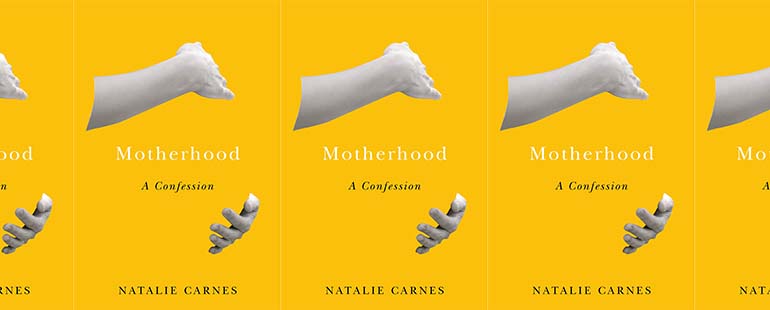Augustine as Literary Companion in Motherhood: A Confession

Augustine’s Confessions has long been regarded as a seminal exploration of human nature. In it, the fourth-century Christian bishop tells his life story with exacting self-scrutiny, shining light upon the shadowy side of his loves, the urgency of his vices, and the joy of an undivided will. The autobiography’s central drama is Augustine’s conversion to Christianity, and the last stronghold against his conversion is his love of sex. “Give me chastity and continence,” prays the saint, “but not yet.” For Augustine, as for most of the influential thinkers in the Christian tradition, the woman’s body is a site of temptation, to be renounced in favor of devotion to God. What do we lose in our understanding of human nature when we do not take the woman’s body—its loves and vices, its will—seriously as a site for theological inquiry? What if such a detailed exploration of human desire as the Confessions were rendered not by a man, but by a mother?
These questions animate Natalie Carnes’s 2020 memoir, Motherhood: A Confession. A feminist theologian, scholar of religion, and mother of young children, Carnes uses the Confessions as a companion text to tell the story of her own conversion—the beautiful crisis of becoming a mother, and the daily revelations of God made visible in the intimacies between mother and child. Fleshy prose about bone marrow and breasts opens into lofty meditations on the magnanimity and pathology of maternal love, offering “another narrative of what it means to be human” by focusing on the lives of women and children.
Motherhood’s engagement with the Confessions is subtle. Carnes doesn’t give close readings of the text or lengthy summaries of Augustine’s story. Instead, she draws the saint into dialogue by speaking his language. Mimicking technical aspects of Augustine’s writing, including point of view, form, and tone, Carnes both celebrates and critiques the pioneering memoir as she gives us her own.
The Confessions is written in the second-person—one long prayer addressed to God. This point of view affects a marked intimacy. Though Augustine was an academic, the use of the second-person voice transforms what could have been a philosophical endeavor written with some degree of detachment into a deeply honest and relational piece of writing. “Let me know you, for you are the God who knows me,” begins Book X. “You are the power of my soul; come into it and make it fit for yourself, so that you may have it and hold it.” He addresses God with language used between lovers. Likewise, Carnes writes her Confession in the second person, adopting the same depth of intimacy. “Always I am drawn to you, called to you at every moment,” she writes. By this technical imitation, Carnes subtly evokes the voice of the saint, calling him into conversation.
But whereas Augustine directs all thirteen books of the Confessions to God, Carnes writes the first nine of her thirteen chapters to her daughter, before turning, in the final four, to her God. The line above, for instance, is addressed not to God but to her child. This contrast inspires consideration of the likeness between God and children. If Carnes subverts the use of the second-person, addressing it not to God but to a child, is she suggesting that God is like a child? That we ought to expect to see God in the young—on their faces, in their fears, in their exclamations? Can God be found in the pregnant body, and the space between an infant’s mouth and a mother’s flesh? “I was your first image of divinity. My body was your cosmos,” Carnes writes to her daughter. “In your need of me, you were also God to me. You were the God who comes to us in Christ needing food, drink, and shelter.” And to God, she writes, “Chesterton imagines You like a child who loves a good trick and so says, over and over, ‘Again, again, again!’ to every sunrise. By Your untiring pleasure, the world goes on. The sun dawns with Your delight again and again.” God is like a womb, like a newborn, like an exuberant child. Adopting and altering Augustine’s use of the second-person address, Carnes insists that the bodies of women and children reveal the very nature of the divine.
In form, Carnes’s book mimics Augustine’s, too. Both are braided meditations, weaving scene-based personal narrative with philosophical reflection and prayer. For example, in the pivotal chapters of the Confessions, in which Augustine finally renounces sex and ambition and turns wholeheartedly to God, he begins with a scene: he and his housemate receive a visit from a man named Ponticianus. From this scene, which includes concrete details like a coffee table book and the glad expression on his visitor’s face, the narration flashes back to what Carnes calls “a nested basket of conversion stories,” in which Ponticianus recounts various friends’ entries into monastic life, one inspired by another. As Augustine sits with his guest, these stories stir turmoil in the saint, torn as he is between desire for God and desire for women, and the prose turns to a meditation on the divided will, then meanders to a primer on various philosophies of the will, before finally returning to the scene of the visit. The writing becomes concrete again as Augustine retreats to his garden, where “beneath a fig tree” and amid a “flood of tears” the famed moment of his conversion transpires. In the narration, the personal, philosophical, and devotional are threaded together.
Carnes practices this way of weaving as well. The chapter titled “Imitation” begins with the scene of her daughter’s baptism. It quickly turns to the study of a story from the life of Christ, opens into a meditation on the sacraments, and ambles into social science scholarship on empathy. Abstract meditation is grounded in the particular as Carnes occasionally returns to embodied narration—to the water in the font, “still as glass,” to the infant’s “tender scalp,” to the “strawberries and lemon cake” served after mass. This chapter builds to a distinctively maternal reflection on the will. While Augustine longs for his divided will to be gathered, Carnes reflects that as a child grows, the once-unified will of parent and infant becomes divided—“I . . . pull back my own will so that yours can come into its own.” Taking up the same narrative form as the Confessions, when Carnes deviates from her literary companion in her exploration of similar themes, she underscores the unique contribution of maternal perspective to the study of human nature.
Finally, Carnes imitates the tone of the Confessions, which is a tone of inquiry. Saint Augustine is often called the first psychologist, so rigorous was his curiosity about his own mind, memory, and motivations. “Let me examine myself again, more closely,” he writes. Seeking utter honesty before God, he “probed the hidden depths of [his] soul and wrung its pitiful secrets from it.” In this sense, the Confessions is a harbinger of contemporary memoir and personal essay. “So often the ‘plot’ of a personal essay, its drama, its suspense, consists in watching how far the essayist can drop past his or her psychic defenses toward deeper levels of honesty,” writes Phillip Lopate in The Art of the Personal Essay (1994). In The Art of Memoir (2015), Mary Karr urges writers to get out of their “psychological hidey-holes,” exposing their “blind spots and false selves.” Augustine turns over every stone in his inner life, examining his youthful hedonism, the pride that lurks beneath his professional ambition, and the misdirection of his desire for love.
His self-scrutiny is exhaustive, and at times I find it exhausting—sometimes he seems to make something of nothing, like the “greed” with which he took his mother’s milk in infancy (“Can one narrate it as sin without slipping into nonsense?” Carnes asks). In my view, the influence of the Confessions in Christian thought has led to a harmful over-emphasis on the sinfulness of the human person rather than a right emphasis on divine love and the dignity of the human person. But at its best, Augustine’s interior examination suffuses the text with a tone of humility and curiosity, through which the narrator seeks to redirect his desires so that they do not harm but heal.
Like Augustine, Carnes’s tone is inquisitive. Her prose is rife with questions, which she answers and then asks again, for she is willing to look at things from multiple angles. Of the process of writing memoir, Karr writes, “Anybody maladroit at apology or changing her mind just isn’t bent for the fluid psychological state that makes truth discoverable,” but Carnes, like Augustine, is open to correction.
In her rigorous self-examination, she discovers the shadow-side of her maternal love: “The slip from loving to harming is easier and subtler than I had imagined,” she writes. The desire to nourish her daughter can devolve into an obsession with being needed. The desire to will her child’s good can be stripped down to the desire to appear to others to be willing her child’s good. The desire to protect her child from suffering can blind both mother and child to others’ suffering: “If my response to your vulnerability is to cut you off from the vulnerable ones of the world, then I maim your soul.” By this exacting interior awareness, she offers the gift of self-reflection of which I don’t feel capable in the immediacy and fatigue of early motherhood.
Reading her words, I sense that my love for my own children is clarified. If only for a moment, my false motives and perverse desires lose their power as they come into my awareness. How is Carnes’s self-scrutiny different from the harmful self-shaming rehearsed by so many contemporary mothers? It does not end in chastisement but in change. It imagines that conversion is possible: not the climactic conversion toward which all of the Confessions aims, but the daily conversions by which we redirect maternal desires—to nourish, protect, and liberate our children—in the current of love.
Imitating the voice, form, and tone of the Confessions, Natalie Carnes invokes Augustine as interlocutor, honoring the text’s literary and moral merits while challenging the blind spots inherent in its masculine perspective. In so doing, she enriches our understanding of human nature and the nature of the divine, revealed in the intimacy exchanged between mother and child.



